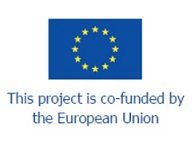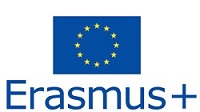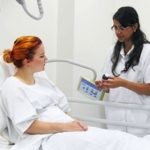 Going International is partner of the Erasmus+ project Nursing on the Move (NoM). NoM is an intensive collaboration to develop a range of tools for e-learning and on-the-job communication for the nursing profession. Under the coordination of the University of Antwerp participants from Austria, Belgium, Finland, Italy, South-Africa, Spain and Sweden are engaged in the Nursing-project which is to last until September 2017. In this context Kris van De Poel was interviewed by the Belgian newspaper Gazet.
Going International is partner of the Erasmus+ project Nursing on the Move (NoM). NoM is an intensive collaboration to develop a range of tools for e-learning and on-the-job communication for the nursing profession. Under the coordination of the University of Antwerp participants from Austria, Belgium, Finland, Italy, South-Africa, Spain and Sweden are engaged in the Nursing-project which is to last until September 2017. In this context Kris van De Poel was interviewed by the Belgian newspaper Gazet.
Learning a language in half a year? That is possible. Swedish government requests help from Antwerp prof to teach refugees language in short order
“They will learn themselves how to order a pint of beer, we teach them how to convey bad news”.
Sweden has requested the help of Antwerp professor Kris Van de Poel to teach medically trained refugees Swedish in no time. Also Finland shows interest in the method, which was developed back in 2007.

It is not only a matter of learning the language, also intercultural communication is an important aspect in the method which Kris Van de Poel, professor in applied linguistics, has developed for academically trained newcomers. “This is a hot topic considering the current challenges with refugees. If someone has to function in a community or society, they will not only have to know the language but also all the behavioural codes. A doctor from Iran starting a career in Sweden, for instance, will have to know that male doctors always shake hands with female colleagues. And that a female head nurse in Sweden is at the same level with a medical doctor. If this is not learned, it will definitely lead to problems. This is key to the model underlying our communication tools”.
The online learning materials developed by Kris Van de Poel are being made to measure for academically trained people who in their own country were involved in medical healthcare. The basis has been designed as a European research project back in 2007. “In Belgium in those days there was a shortage of nurses. With the method we trained Polish and later Rumanian nurses who started work at the University Hospital in Antwerp. The materials are also being used in the Brussels public hospitals to teach their staff Dutch and English. Abroad, the materials are among others in use in the Netherlands, Germany, Italy, Austria, Denmark, Sweden, the United States and South Africa.
With the refugee crisis the online learning materials are again focus of attention. Last year Swedish authorities contacted Kris Van de Poel to deploy the method in Sweden with medically trained refugees. The language classes in Sweden then were not really a success: only 13 % succeeded for the obligatory language exam. Kris Van de Poel: “This is really demotivating, both for the teachers, the officials who finance the programmes as well as for the people themselves”.
Ordering Catheters
The method is now being introduced in Sweden to swiftly teach medically trained refugees Swedish. “Since Sweden has a shortage of medical staff in health care refugees with a medical background are being offered a shortened training trajectory or snapspor. Language training is an important component. First when they know the language, they will be offered a job. We teach people the language in function of their future job. Ordering a pint in a pub they will learn themselves. We teach them to order catheters in different sizes and how to summarize patient files. Instead of talking to someone on the street, we teach them how to greet a patient or convey bad news. These are all elements they need in their every day working life”.
Other aspects taught are, for instance, that a doctor does not talk to a patient with Latin-based terminology like ‘abdomen’, but rather uses ‘stomach’ or when examining a child will refer to their belly. The materials also address how to identify difficult and taboo topics. Kris Van de Poel: “Partners may have pet names for their genitalia. It is important that the doctor can evaluate the language use of the patient and does not echo it without reflecting about it”.
For beginners the materials are being divided in different chapters, with short videos, audio and re-enacted scenarios. For this component there is a collaboration with students of nursing at the AP School of Higher Education in Antwerp and the degree programme in nursing in Tampere (Finland) who made the films. To motivate course participants, gamification elements have been incorporated where learners compete with themselves or each other. Since the course takers have a medical background there is an anatomical and visual explanation of how sounds have to be pronounced and where the airstreams pass, etc. All materials are online and the course is individual but there are also closed groups where course takers can discuss different matters and learning routines or ask for help from a tutor. For advanced use there is an app which can be used in the clinical setting to quickly look something up. In Sweden the first 60 course takers started in winter. On 19 January 2016 the project was officially launched for a second group of course participants.
Increased self esteem
Also in Sweden there is a dispersion of the refugees who come flocking in. Since distances in that country are immense but libraries are well equipped with computers and internet connections the online learning method is a good solution. “The first reactions are very positive”.
“Because the learning materials dovetail so nicely with people’s educational background, they feel taken seriously, which increases their self esteem and thus also their motivation to learn. Professionals who decide to leave their own country want to feel useful in their adoptive homeland. Moreover, a working life enhances integration for themselves and their family”.
 In Belgium the materials are not being used for refugees as yet. Kris Van de Poel: “It would be very useful here too, but I have not received any queries yet. There are talks underway to use the materials with Flemish doctors who are in contact with a high number of foreign patients”. In the meantime, plans are being made to develop materials for engineers, IT and academics.
In Belgium the materials are not being used for refugees as yet. Kris Van de Poel: “It would be very useful here too, but I have not received any queries yet. There are talks underway to use the materials with Flemish doctors who are in contact with a high number of foreign patients”. In the meantime, plans are being made to develop materials for engineers, IT and academics.
Originally published in the Belgian newspaper Gazet van Antwerpen 2016; journalist: Maaike Floor
Published in GI-Mail 09/2016 (English edition). Sign up for GI-Mail here.
Tip: More up to date educational events can be found online in the Education Database »medicine & health«.

